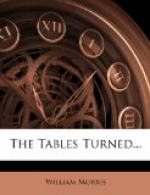Mr. H. Once more, my lord and gentlemen of the Jury, I rise to address you; and, gentlemen, I must congratulate you on having the honour of assisting on two State trials on one day; for again I am instructed by the Secretary of State for the Home Department to prosecute the prisoner. He is charged with sedition and incitement to riot and murder, and also with obstructing the Queen’s Highway. I shall bring forward overwhelming evidence to prove the latter offence—which is, indeed, the easiest of all offences to be proved, since the wisdom of the law has ordained that it can be committed without obstructing anything or anybody. As for the other, and what we may excusably consider the more serious offence, the evidence will, I feel sure, leave no doubt in your minds concerning the guilt of the prisoner. I must now give you a few facts in explanation of this case. You may not know, gentlemen of the Jury, that in the midst of the profound peace which this glorious empire now enjoys; in spite of the liberty which is the proud possession of every Briton, whatever his rank or fortune; in spite of the eager competition and steadily and swiftly rising wages for the services of the workmen of all grades, so that such a thing as want of employment is unheard of amongst us; in spite of the fact that the sick, the infirm, the old, the unfortunate, are well clothed and generously fed and housed in noble buildings, miscalled, I am free to confess, workhouses, since the affectionate assiduity of our noble Poor Law takes every care that if the inmates are of no use to themselves they shall at least be of no use to any one else,—in spite of all these and many kindred blessings of civilisation, there are, as you may not know, a set of wicked persons in the country, mostly, it is true, belonging to that class of non-respectable foreigners of whom my lord spoke with such feeling, taste, and judgment, who are plotting, rather with insolent effrontery than crawling secrecy, to overturn the sacred edifice of property, the foundation of our hearths, our homes, and our altars. Gentlemen of the Jury, it might be thought that such madmen might well be left to themselves, that no one would listen to their ravings, and that the glorious machinery of Justice need no more be used against them than a crusader’s glittering battle-axe need be brought forward to exterminate the nocturnal pest of our couches. This indeed has been, I must say unfortunately, the view taken by our rulers till quite recently. But times have changed, gentlemen; for need I tell you, who in your character of shrewd and successful men of business understand human nature so well, that in this imperfect world we must not reckon on the wisdom, the good sense of those around us. Therefore you will scarcely be surprised to hear that these monstrous, wicked, and disreputable doctrines are becoming popular; that murder and rapine are eagerly looked forward to under such names as Socialism, revolution, co-operation,




